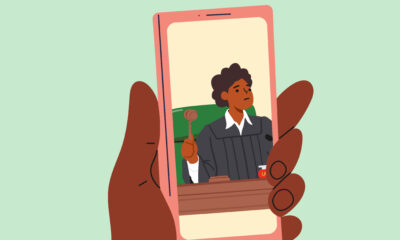Features
Laetitia Mugerwa: We Need to Bring an End to Cyber Violence
Social media is increasingly becoming a hopeless place where, at the click of a mouse, any Tom, Dick, and Harry can fly without wings. The few accomplished people are now victims to the many who inconsiderately yearn for fame and popularity. It’s not enough for the world to talk only about the joy it brings for brands, revenues, and promotions, someone must start talking about the health and social problem of its abuse and misuse.

A friend of mine once shared her online experience with me. She met a charming stranger on social media. He started by liking all her photos. It appeared that even the stupidest post made much sense in the stranger’s eyes. It didn’t take long for him to hit her inbox with consistent good mornings and hellos. Being an extrovert herself, she responded well and with time, they exchanged a few photos and songs. A few days later, the stranger requests for a hook-up. Without a second thought, she said “no, I don’t do strangers”. Perhaps the stranger never read the response or chose to ignore them, he unswervingly asked to meet her and started stalking her.
His daily texts started to torment her. For a while, she decided to ignore them but the texts, likes, and comments never ceased coming. It became too much that she finally decided to block him. She felt like freedom had finally come through.
Her freedom only lasted a few days. After that, she found new people, tags, and texts in her inbox. Shockingly, one claimed that he knew her and threatened to make public her nude photos! She first took it for a joke, but the stranger’s insistence started to bother her. She confided in me how she had never taken a nude photo or shared anything close to nudity with anyone. “Not even in my wildest dreams!” she cried. When she scrolled down her inbox, there they were – the ‘nude photos’. The stranger had perfectly edited her photos and made them appear so nude that even an expert would be electrified.“I didn’t know what to do at that moment,” she said.
She was as angry as she was frightened. As she pondered on the next course of action, her phone started ringing. “Almost everyone in my phonebook was calling. Even people I thought were dead,” she noted. It seemed like she was the most trending personality on social media; online tabloids, bloggers, groups were all sharing the photos. Friends and foes were all caught up in the social media brawls. Never had there been a day in her life like that day. All hell was set loose on her. Her denial of the photos only fueled more criticism and satire. To this day, she hasn’t emotionally recovered from that incident.
In the absence of stringent laws, checks, and balances, perpetrators of cyberbullying and harassment have caused pain and tarnished reputations beyond measure. There are increasing numbers of mental health challenges and illnesses arising from social media bullying, blackmail, and harassment. Governments and law enforcement bodies often choose to ‘solve this problem’ by ignoring it. Often, the victims are always blamed for “making their private lives so public!”
Social media is increasingly becoming a hopeless place where, at the click of a mouse, any Tom, Dick, and Harry can fly without wings. The few accomplished people are now victims to the many who inconsiderately yearn for fame and popularity. It’s not enough for the world to talk only about the joy it brings for brands, revenues, and promotions, someone must start talking about the health and social problem of its abuse and misuse.
In some countries like the United States, the Centers for Disease Control and Prevention (CDC) has already designated cyberbullying and electronic aggression as a serious public health threat. Reports from the United Nations Agency for children, UNICEF has shown that one in three young people in 30 countries has been a victim of cyber violence and bullying. The anonymity of the cyberbullies is matched by a vast potential audience for the abuse to be carried out and fueled by the trouble of detaching oneself from the cyber environment.
It is critical for governments, civil society, and stakeholders to strengthen laws and regulations governing the cyberspace. Online psychological programs like counseling, advisory guides and tools must be made readily available for victims and survivors. Stakeholders should conduct media campaigns against cyberbullying, allow victims to speak out, and allow bullies to not just apologise, but commit to bringing an end to cyberbullying, harassment, and violence.



















